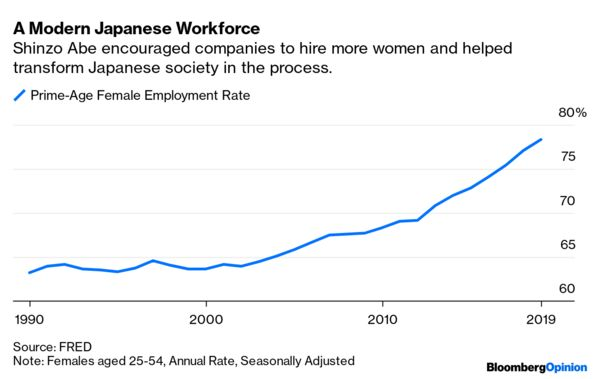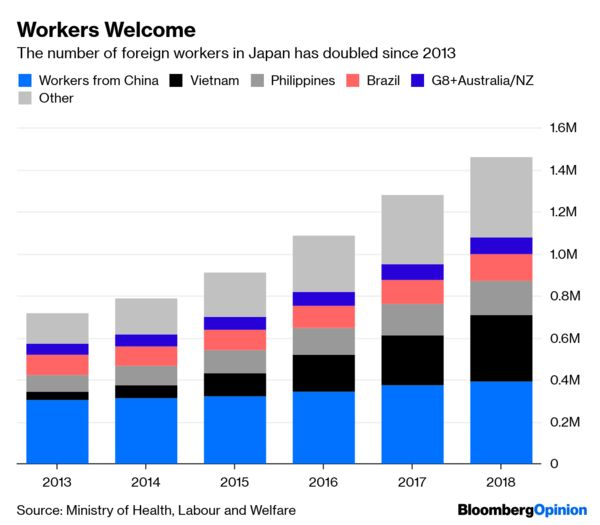1/Shinzo Abe, Japan& #39;s longest-serving Prime Minister, is retiring due to ulcerative colitis.
Today& #39;s @bopinion post is about what he achieved during his tenure in office. https://www.bloomberg.com/opinion/articles/2020-08-28/shinzo-abe-s-legacy-in-japan-goes-far-beyond-abenomics?sref=R8NfLgwS">https://www.bloomberg.com/opinion/a...
Today& #39;s @bopinion post is about what he achieved during his tenure in office. https://www.bloomberg.com/opinion/articles/2020-08-28/shinzo-abe-s-legacy-in-japan-goes-far-beyond-abenomics?sref=R8NfLgwS">https://www.bloomberg.com/opinion/a...
2/When Abe came to power at the end of 2012, I was skeptical. His first tenure in office, in the mid-2000s, had been market by the same mediocrity as a typical leader from Japan& #39;s long-ruling Liberal Democratic Party.
My expectations were quite low.
http://noahpinionblog.blogspot.com/2012/12/trust-not-in-shinzo-abe-ye-monetarists.html">https://noahpinionblog.blogspot.com/2012/12/t...
My expectations were quite low.
http://noahpinionblog.blogspot.com/2012/12/trust-not-in-shinzo-abe-ye-monetarists.html">https://noahpinionblog.blogspot.com/2012/12/t...
3/In addition, many people believed that Abe would be a right-wing leader -- even a fascist one. Right-wing nationalists were his power base, and his clique within the LDP. I had no reason to doubt the prevailing notion of Abe as an ultraconservative.
4/But Abe gathered a group of excellent advisors around him -- economist Koichi Hamada, Bank of Japan governor Haruhiko Kuroda, cabinet minister Yoshihide Suga, and his own wife, Akie Abe.
Together they gave birth to what became known as Abenomics. https://www.bloomberg.com/opinion/articles/2018-02-14/keeping-haruhiko-kuroda-at-bank-of-japan-was-the-right-call?sref=R8NfLgwS">https://www.bloomberg.com/opinion/a...
Together they gave birth to what became known as Abenomics. https://www.bloomberg.com/opinion/articles/2018-02-14/keeping-haruhiko-kuroda-at-bank-of-japan-was-the-right-call?sref=R8NfLgwS">https://www.bloomberg.com/opinion/a...
5/Abenomics started off with an unprecedented program of monetary easing. Consumption and investment rose, and Japan enjoyed the longest unbroken run of economic growth in decades. https://www.bloomberg.com/opinion/articles/2019-04-11/japan-s-economy-is-an-example-for-other-developed-nations?sref=R8NfLgwS">https://www.bloomberg.com/opinion/a...
6/On fiscal policy (the "second arrow" of Abenomics), Abe was unable to deliver. Buffeted by conflicting pressures for tax hikes and stimulus spending, he ended up charting a middle path, and not much happened. https://www.bloomberg.com/opinion/articles/2016-08-03/japan-s-new-stimulus-is-just-the-same-old-thing?sref=R8NfLgwS">https://www.bloomberg.com/opinion/a...
7/But the "third arrow" of Abenomics -- structural reform -- may prove to be the most important by far. It set the stage for a deep and lasting transformation of Japan& #39;s economy.
8/Abe took on the country& #39;s cosseted, hidebound farm lobby, increasing competition and opening up the country to imported food products. https://www.bloomberg.com/news/articles/2015-02-10/japan-s-farm-lobby-concedes-to-abe-s-agriculture-reform-plans?sref=R8NfLgwS">https://www.bloomberg.com/news/arti...
9/As the U.S. and much of the world slipped into protectionism, Abe boldly championed trade agreements. https://www.bloomberg.com/opinion/articles/2017-10-05/japan-rises-as-a-free-trade-leader-as-the-u-s-sinks?sref=R8NfLgwS">https://www.bloomberg.com/opinion/a...
10/His administration issued a corporate governance code that pushed companies to include outside oversight and to be more profitable. It also weakened the toxic practice of cross-shareholding. https://www.strategy-business.com/article/Japan-is-loosening-corporate-governance-constraints?gko=40d13">https://www.strategy-business.com/article/J...
11/Corporate profits have surged in Japan, adding to government revenues and reducing deficits. The country has also developed a private equity industry that is helping family businesses consolidate after founders die without heirs. https://www.bloomberg.com/opinion/articles/2017-08-20/private-equity-will-do-a-lot-of-good-for-japan-inc?sref=R8NfLgwS">https://www.bloomberg.com/opinion/a...
12/Abe also took steps to discourage the wasteful long unproductive work hours that are common in corporate Japan. https://www.bloomberg.com/opinion/articles/2017-06-20/japan-gains-ground-on-wasteful-workaholics">https://www.bloomberg.com/opinion/a...
13/All in all, Abe made inroads toward shifting Japan to a corporate culture more focused on efficiency and productivity, instead of long hours and seniority. https://www.bloomberg.com/opinion/articles/2017-08-15/for-the-sake-of-productivity-put-a-woman-in-charge?sref=R8NfLgwS">https://www.bloomberg.com/opinion/a...
14/But Abe& #39;s most important changes were the changes he made to Japan& #39;s labor market.
These not only boosted the economy, but will alter the course of Japanese society for many years to come.
I& #39;m talking, of course, about A) gender equality, and B) immigration.
These not only boosted the economy, but will alter the course of Japanese society for many years to come.
I& #39;m talking, of course, about A) gender equality, and B) immigration.
15/With subsidized government child care, paternity leave, and preferential government contracting for companies that hired women, Abe used many policy levers to get Japanese women into the workforce.
He succeeded.
He succeeded.
16/And with a series of pro-immigration programs -- a "guest worker" program with a path to permanent residence, and a fast-track permanent residency program for skilled workers -- Abe dramatically increased immigration to Japan. https://www.bloomberg.com/opinion/articles/2019-05-22/japan-begins-experiment-of-opening-to-immigration?sref=R8NfLgwS">https://www.bloomberg.com/opinion/a...
18/In 2018, 1 out of 8 people turning 20 in Tokyo wasn& #39;t born in Japan. That number, of course, doesn& #39;t include members of racial and ethnic minorities who WERE born in Japan. https://www.japantimes.co.jp/news/2018/01/10/national/coming-age-1-8-new-adults-tokyo-not-japanese-ward-figures-show/#.XONggMgzZPY">https://www.japantimes.co.jp/news/2018...
19/Increased women& #39;s employment and immigration have helped Japan& #39;s economy. But they are also changing Japan& #39;s culture in deep and unprecedented ways.
20/For example, Japanese women are beginning to fight back more against sexual harassment. https://www3.nhk.or.jp/nhkworld/en/news/backstories/361/">https://www3.nhk.or.jp/nhkworld/...
21/And women are demanding that men do more child care. https://www.japantimes.co.jp/news/2019/10/26/national/media-national/will-japanese-society-let-fathers-help-child-care/">https://www.japantimes.co.jp/news/2019...
22/Once firmly ensconced in the workplace, women are also starting to demand promotions, and the Abe administration tried to help push companies to promote more women. https://www.bloomberg.com/opinion/articles/2015-08-18/job-is-half-done-for-japan-s-working-women?sref=R8NfLgwS">https://www.bloomberg.com/opinion/a...
23/Meanwhile, as a result of immigration, as well as Japan& #39;s unprecedented tourism boom, Japan has become a far more open and globalized society. https://asia.nikkei.com/Spotlight/The-Big-Story/Japan-gets-more-than-it-bargained-for-with-tourist-boom">https://asia.nikkei.com/Spotlight...
24/Abe hasn& #39;t simply presided over an increase in diversity in Japan; he has encouraged and supported it.
For example, in response to the emergence of an anti-Korean hate group in the early 2010s, Abe passed Japan& #39;s first law against hate speech. https://www.japantimes.co.jp/news/2016/05/24/national/social-issues/diet-passes-japans-first-law-curb-hate-speech/">https://www.japantimes.co.jp/news/2016...
For example, in response to the emergence of an anti-Korean hate group in the early 2010s, Abe passed Japan& #39;s first law against hate speech. https://www.japantimes.co.jp/news/2016/05/24/national/social-issues/diet-passes-japans-first-law-curb-hate-speech/">https://www.japantimes.co.jp/news/2016...
25/And members of anti-Korean hate groups have actually been prosecuted for hate speech!
As a result, the hate groups& #39; activism has mostly died down. https://www.japantimes.co.jp/news/2018/04/24/national/crime-legal/former-zaitokukai-member-pressed-libel-charges-hate-speech-korean-school-kyoto/">https://www.japantimes.co.jp/news/2018...
As a result, the hate groups& #39; activism has mostly died down. https://www.japantimes.co.jp/news/2018/04/24/national/crime-legal/former-zaitokukai-member-pressed-libel-charges-hate-speech-korean-school-kyoto/">https://www.japantimes.co.jp/news/2018...
26/It& #39;s worth reflecting on how astonishing this all is. A ton of people thought Abe would be an ultraconservative, even a fascist.
Instead, he became the most liberal leader in modern Japanese history, leaving behind a Japan that is utterly changed and far more open and modern.
Instead, he became the most liberal leader in modern Japanese history, leaving behind a Japan that is utterly changed and far more open and modern.
27/Abe didn& #39;t succeed with all of his reform initiatives. And Japan is not yet among the world& #39;s most diverse or gender-equal nations. Outdated corporate culture is eroding, but still a millstone around the country& #39;s neck.
But Abe& #39;s changes are unprecedented and stupendous.
But Abe& #39;s changes are unprecedented and stupendous.
28/Future leaders will have a difficult time living up to Abe& #39;s legacy of bold liberal reformism.
But they should definitely try.
(end) https://www.bloomberg.com/opinion/articles/2020-08-28/shinzo-abe-s-legacy-in-japan-goes-far-beyond-abenomics?sref=R8NfLgwS">https://www.bloomberg.com/opinion/a...
But they should definitely try.
(end) https://www.bloomberg.com/opinion/articles/2020-08-28/shinzo-abe-s-legacy-in-japan-goes-far-beyond-abenomics?sref=R8NfLgwS">https://www.bloomberg.com/opinion/a...
Oh, and if you want to read a book about Abe, let me recommend "The Iconoclast", by @observingjapan. https://www.amazon.com/Iconoclast-Shinzo-Abe-New-Japan/dp/1787383105">https://www.amazon.com/Iconoclas...

 Read on Twitter
Read on Twitter



